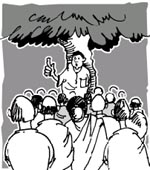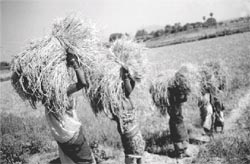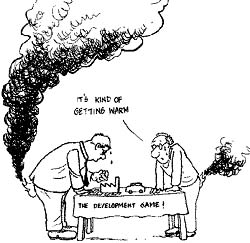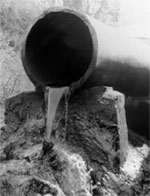
Climate convention generates heat and dust
India passes back the buck to industrialised nations as wranglings over the Climate Change protocol continue

India passes back the buck to industrialised nations as wranglings over the Climate Change protocol continue
Nepal is slated to be a major hydropower supplier in South Asia with the recent signing of a Memorandum of Understanding (MoU) with the Australian government for a US$ 590-million 360-megawatt project on the Karnali river. But Nepal"s big projects, like t

WHO endorses GM crops, overlooks negative reports
US politicians cannot keep mouthing morality without learning the morality associated with global cooperation and coexistence
THE Review Committee on the Sardar Sarovar Project, instead of taking a principled stand and rejecting the extremely limited frame of reference set by the government, produced a report that was

THE reality of participation has often differed from the rhetoric. In fact, much development, which is participatory in nature, has remained top-down in practice. This may be so because even though

Groups of tribal women in Orissa are fighting against authorities to improve their lot by consolidating the trade of minor forest produce
Delhi has been waiting. For its neighbour, Uttar Pradesh up , to release water to its swank Sonia Vihar water treatment plant. The prime minister himself intervenes in the matter. He persuades up

The WHO initiates global move to check the onslaught of malaria

Concerns about the world's indigenous peoples were conveniently sidelined as bio safety centrestage at the recent biodiversity meeting in Nassau

The role of dais, traditional Indian midwives, is being reevaluated as modern medicine finds their lore ideally suited to Indian conditions

How the villagers of Pujara Ki Chowki foiled hamhanded attempts of the state forest department to force start a plantation on a forest already protected and nurtured by the people

In 20 years, Chipko has acquired many facets, primarily as a conservation endeavour by the poor, a struggle for local control of natural resources and an effort by women to protect their environment. Chipko influenced the world, but have its local object

Climate change negotiations get emotional because carbon dioxide emissions are closely related to individual lifestyles and to national economies. For instance, the per capita GHG emissions of one US citizen were equal to those of 19 Indians in 1996

While private service stations bear the brunt of the Delhi government s green brigade, polluting railway service stations go scot free

GEF should have been a liability fund, rather than a guilt fund set up by the North to make up for the global damage it had caused

"HISTORY repeats itself, the first time as tragedy and the second time as farce." In 1982, protests by tribal groups and urban environmentalists led to the withdrawal of a draft Forest Bill. This

Wind energy promises a refreshing breather, providing a low cost and ecofriendly alternative

A small village has proved that people's management of forests can bring prosperity

The only way to prevent traditional water tanks from self-destruction is to hand over their maintenance to the people